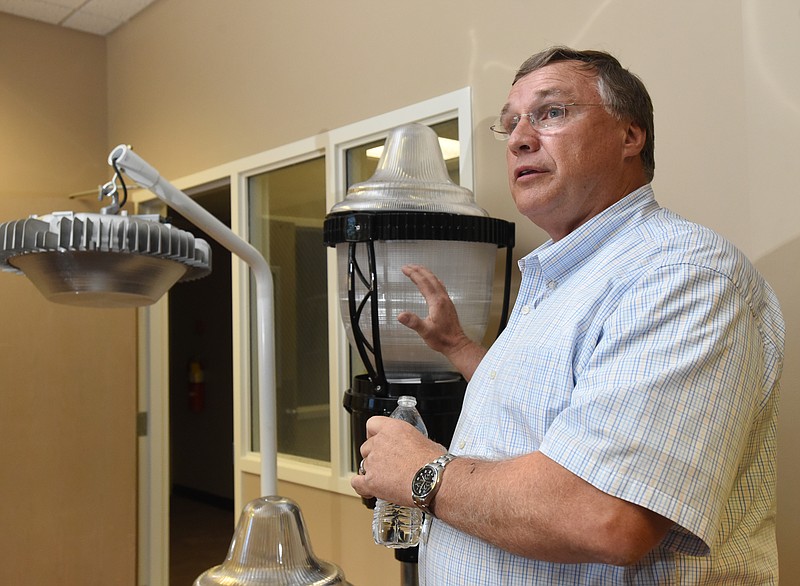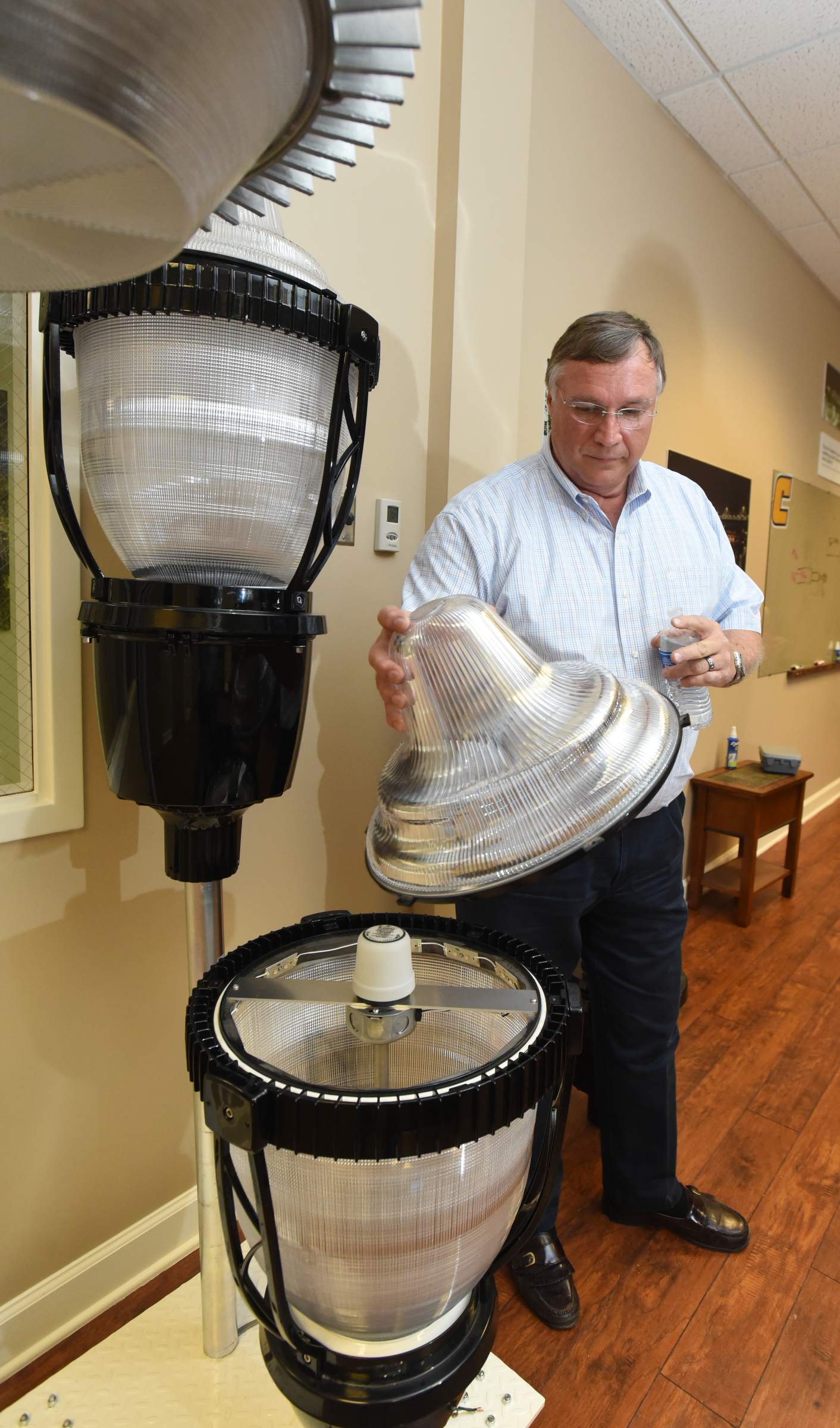
In 2013 when Don Lepard opened his new Global Green Lighting factory in Hixson, government officials heralded the radio-controlled LED streetlamps as one of Chattanooga's most innovative products and praised Lepard for bringing production back from China to Chattanooga.
"Places like Global Green Lighting are really the future, not just for Chattanooga and Tennessee, but for the nation and the world," said Zach Wamp then, who joined GGL's board after leaving Congress and helped pitched the unique streetlamp model to two dozen cities.. "Real large institutions have validated the technology as very legitimate and some of the institutions have even called it the best lighting system in America today for cities."
But four years after Lepard opened his factory and put up more than 5,000 of the energy-efficient, controllable lights, the city has not only canceled the contract with Global Green Lighting but quit trying to control the lights and avoided using Lepard's company for other streetlight purchases.
City officials insist they wanted Lepard's venture to be successful, but too many of his lights burned out too quickly and the metering on the lights proved unreliable. Although GGL bragged its system would be able to meter usage at each light to measure energy efficiency, a city report last year indicated that nearly 40 percent of the lights failed to measure any power usage and others were artificially capped when the city terminated GGL's contract last March.
"Too many of the lights simply didn't work as promised," David Carmody, the city's former purchasing manager and chief operating officer, said last year after the city ended its contract with Global Green Lighting.
EPB said two years ago it was unable to rely upon the accuracy of the light meters and went back to its previous method of billing for streetlights, negating most of the promised savings from the $6 million the city spent to buy and install the first 6,000 GGL metered lights. The company that provided the metering system for GGL, Sensus USA Inc., also got a $900,000 arbitration judgment against GGL in a default judgment over the Chattanooga lights in 2015, which the city also cited in its termination notice to Lepard.
But Lepard insists the city under Mayor Andy Berke, encouraged by EPB, which previously controlled all of the city's streetlamps, has not given GGL the support needed for the startup project to succeed and has ended up spending more on new lights as a result.
In a news release Tuesday, Lepard said he was unfairly shut out last year of a new contract to provide more LED lights to the city with his new company, Smart City Management.
The city agreed last September to buy 200 decorative LED streetlights - and potentially many more over the 3-year life of the contract - from Gexpro, at a price of $257 more for each light than what Smart City Management proposed.
"When Berke said in 2014 that he welcomed a GGL bid on the next round of streetlights, he lied," Lepard said. "This is just the latest in years of efforts by Berke to get rid of us and our technology, and he was willing to sacrifice local jobs to do it."
Lepard, who released the scathing attack on the mayor a week ahead of next week's city elections, insisted he was not making his charges for political reasons and he no longer even lives in the city.
City officials say Lepard was able to bid, but Gexpro's bid better met Chattanooga's lighting specifications.
Lepard said when the city initially declined to buy GGL lights for the entire city - and then later terminated its contract with GGL altogether - he was forced to shut down his Hixson factory, sell his house to pay his employees and move to the county.
Lepard said he started Smart City Management as a totally separate company from Global Green Lighting and the company has already won a contract to install lights in the city of Red Bank.
Smart City Management offered to install its LED lights for $638 each, or nearly 29 percent cheaper than the Gexpro bid that the city ultimately accepted. Lepard challenged the city award, but city officials said the Gexpro offer was a better fit for the city's lighting needs.
"Although some of the products offered by other suppliers were lower in price, the Gexpro product fits our streetlight posts exactly, without need for an adapter, and is made of superior materials which should be better at retaining the paint coating," Bonnie Woodward, the city's purchasing agent, wrote in a memo last August.
In addition to the city of Chattanooga, Lepard said GGL sold its metered lights to the University of Alabama, Tennessee Tech and Memphis State University. He said the lights proved effective at the other installations.
Lepard had hoped to ramp up its production and employ 250 workers by replacing all of the more than 27,000 streetlights in Chattanooga. But the contract with the city was terminated before such an expansion could happen.
EPB installed the streetlights and was to receive the metered information about the power consumption about the lights from GGL's metering contractor, Sensus USA. But Lepard said the city never paid Sensus for the cloud-based metering that the contract required.
Lepard also said EPB was skeptical of the GGL model from the start and kept telling the city about the lighting problems. He pointed out that EPB's assessment of lights the utility installed in the past also proved not to be accurate on thousands of poles.
"When any light failed, I paid to have a third party contractor go out, retrieve the light and replace it," Lepard said. "They kept trying to take this away from me, and I kept trying to fix it."
Berke's approach to the Global Green Lighting contract also drew fire from one of his mayoral rivals, former City Councilman David Crockett. As director of sustainability under former Mayor Ron Littlefield, Crockett helped steer part of a $1.8 million city stimulus grant for GGL five years ago to test its metered lights in Coolidge Park.
"There's nothing unique about just having LED lighting, but networking LED lights like what Don (Lepard) has done is amazing," Crockett said, promising a more innovative administration if he is elected mayor. "He put 2 and 2 together and came up with 6. It was just genius and Don was creating a whole new industry."
Crockett said GGL had fewer problems than he expected with the new technology and said the city and EPB should have done more to make the new technology work in the city and use its adjustable lights to fight crime and cut energy consumption.
"We knew we would have hiccups with the electric lights, but we were breaking in a new technology, creating jobs and changing an industry in ways that will bring people to Chattanooga from all over America," Crockett said.
If elected, Crockett said he would work to reactivate installation of the GGL metered and networked streetlights under closer oversight by the city.
But Berke Campaign Manager Tyler Yount said Crockett worked to fund "an unproven and overly expensive product that simply didn't work" and will "leave taxpayers in the dark."
"It was a bad deal then, and it's a bad deal now," Yount said. "It took down lights that worked - and would work for several more years - and replaced them with lights that often burned out in mere months."
Contact Dave Flessner at dflessner@timesfreepress.com or at 423-757-6340.

